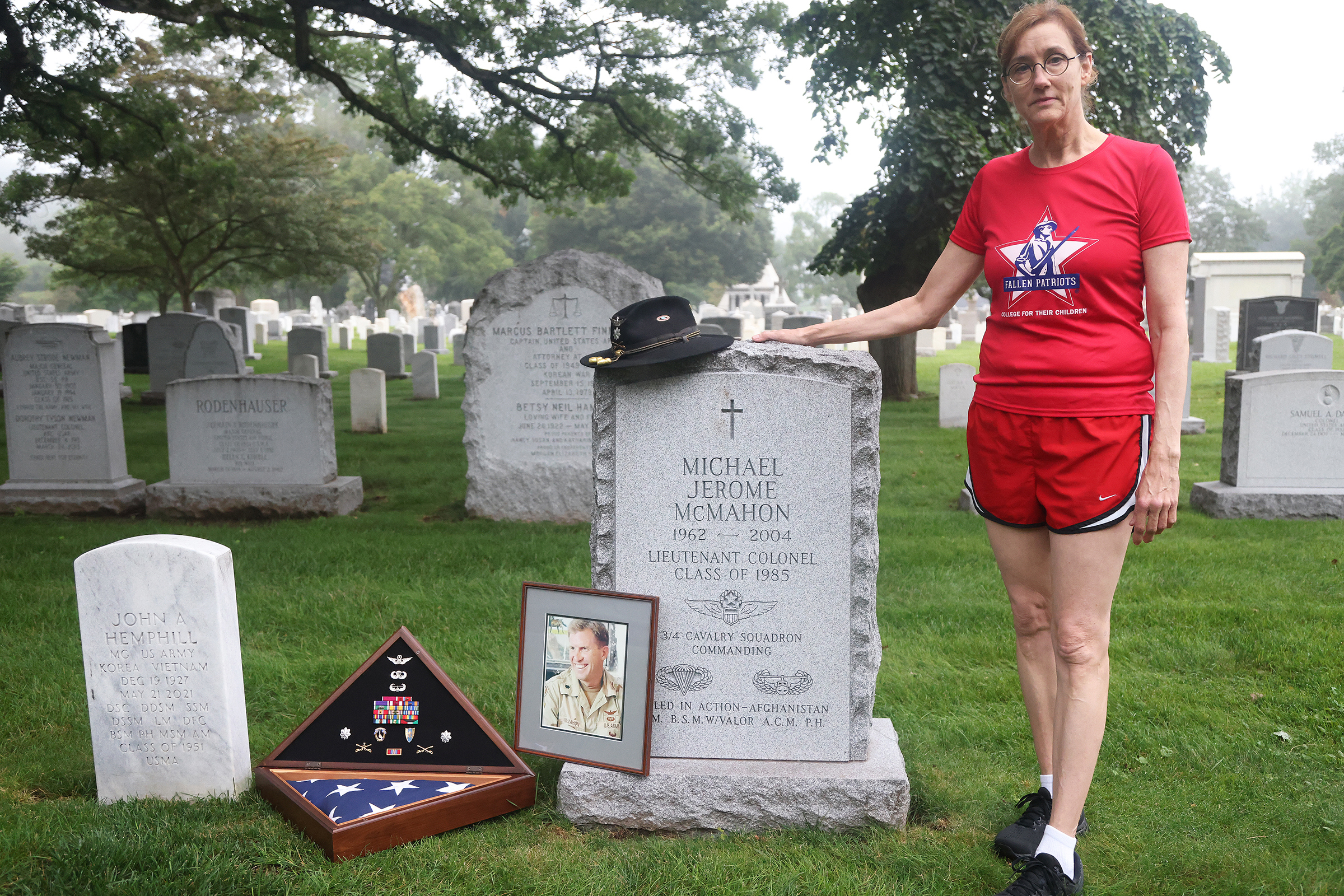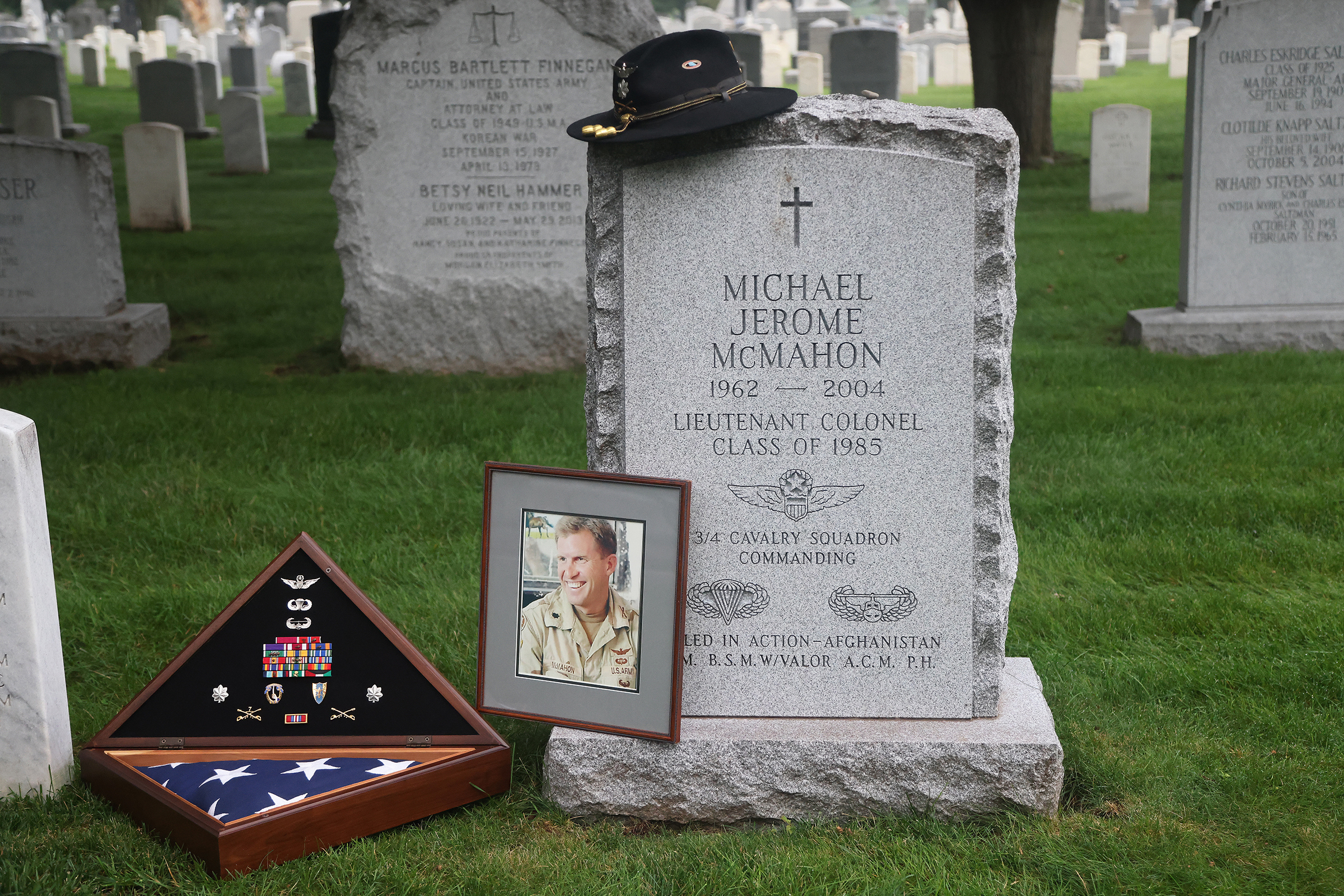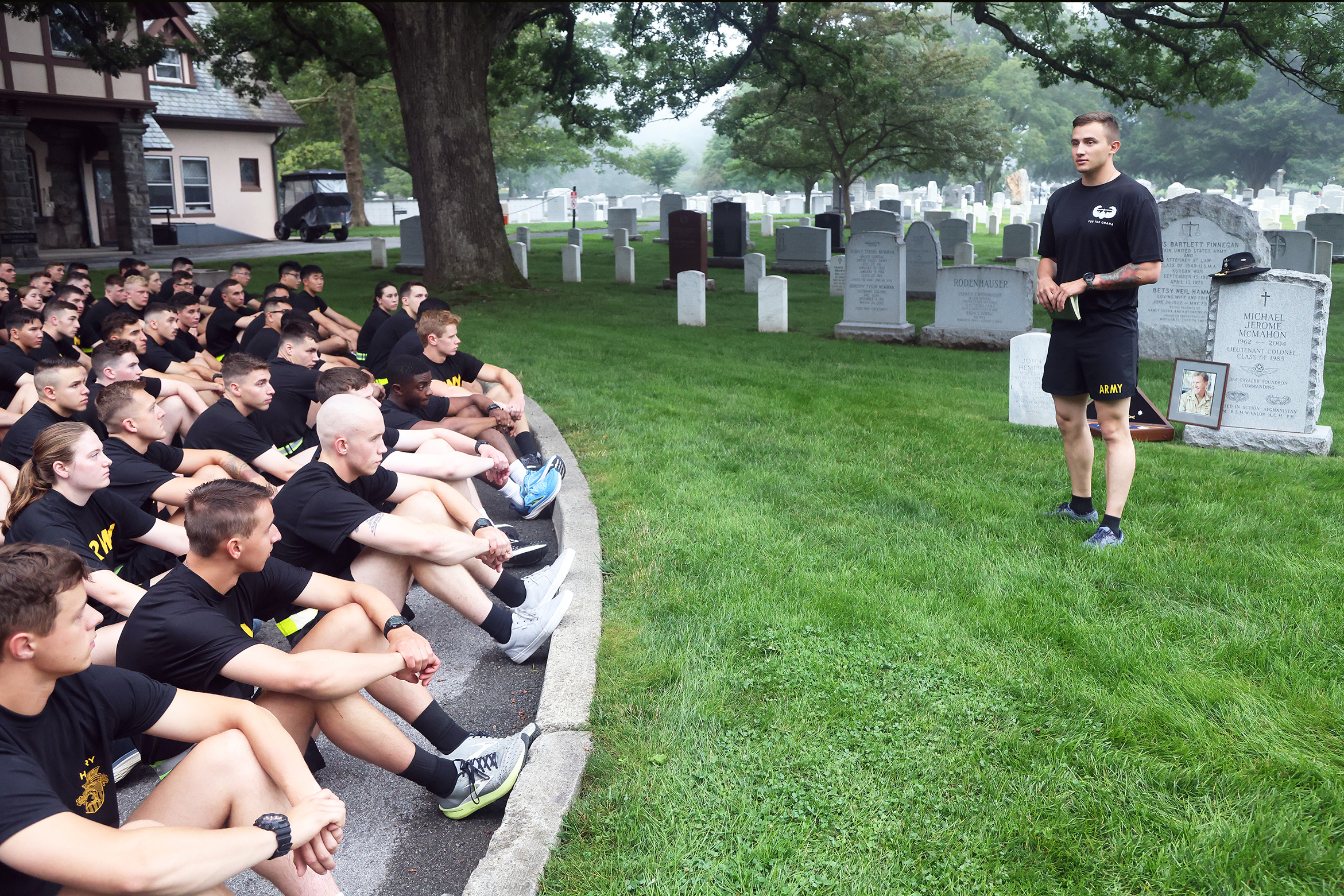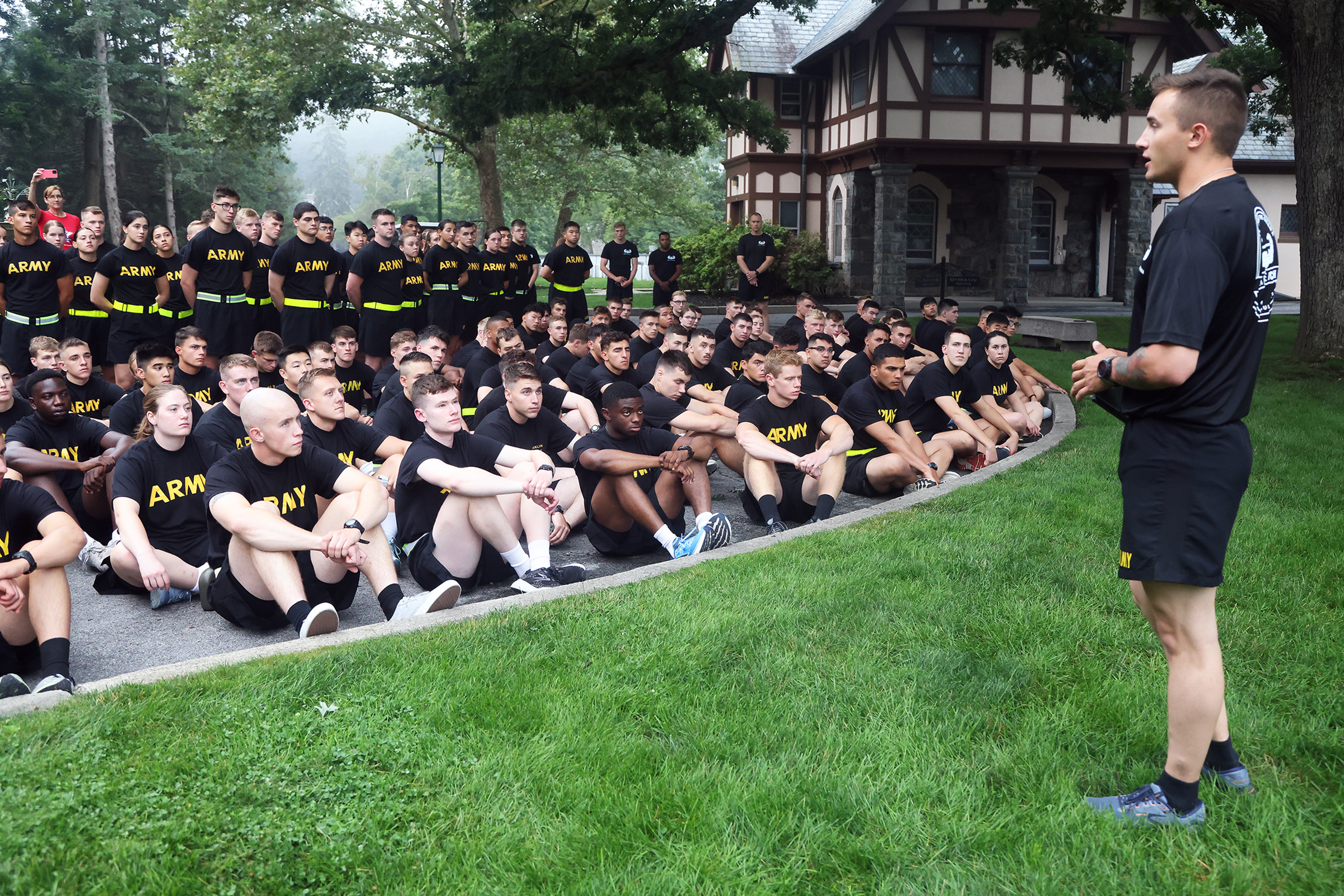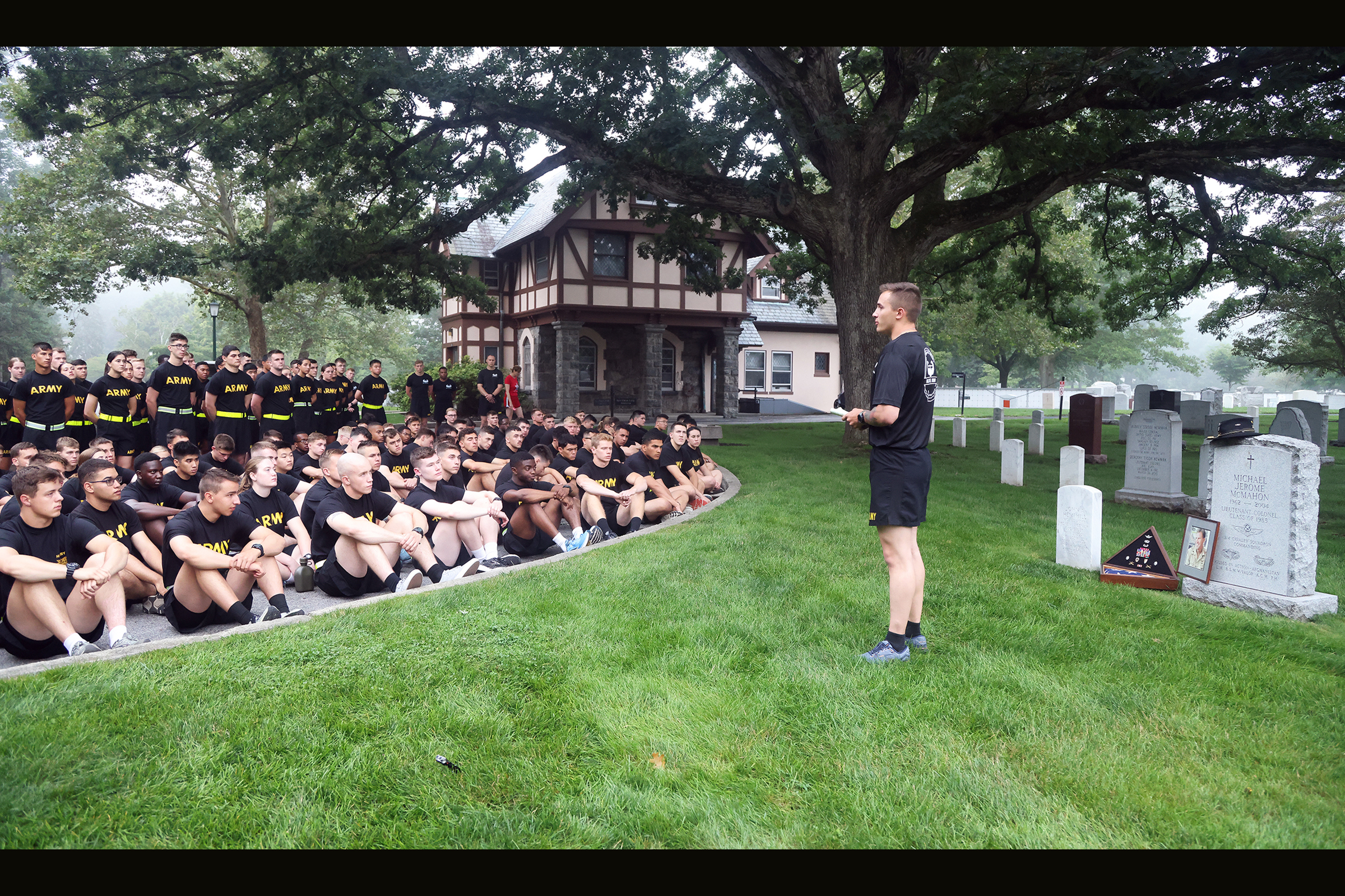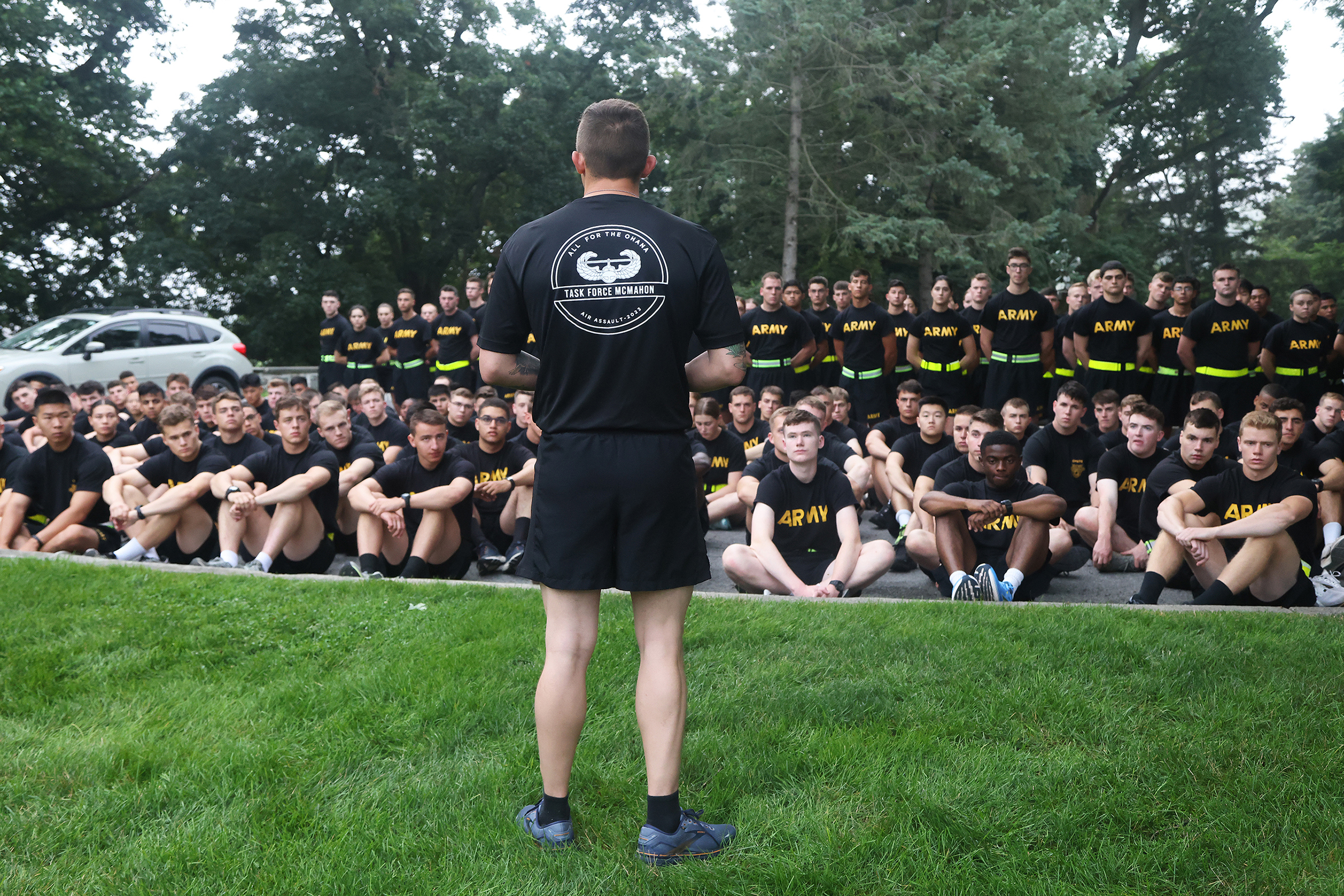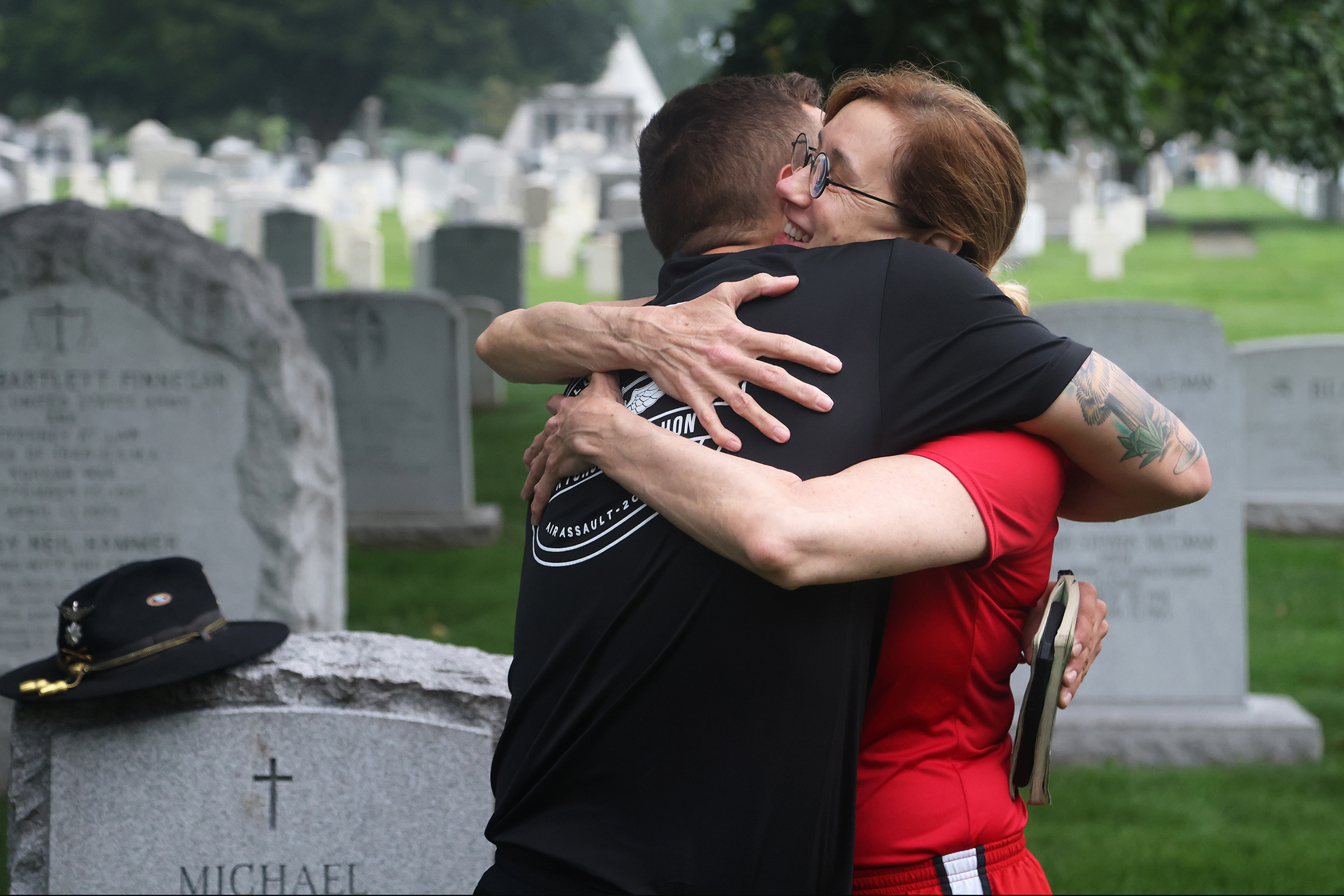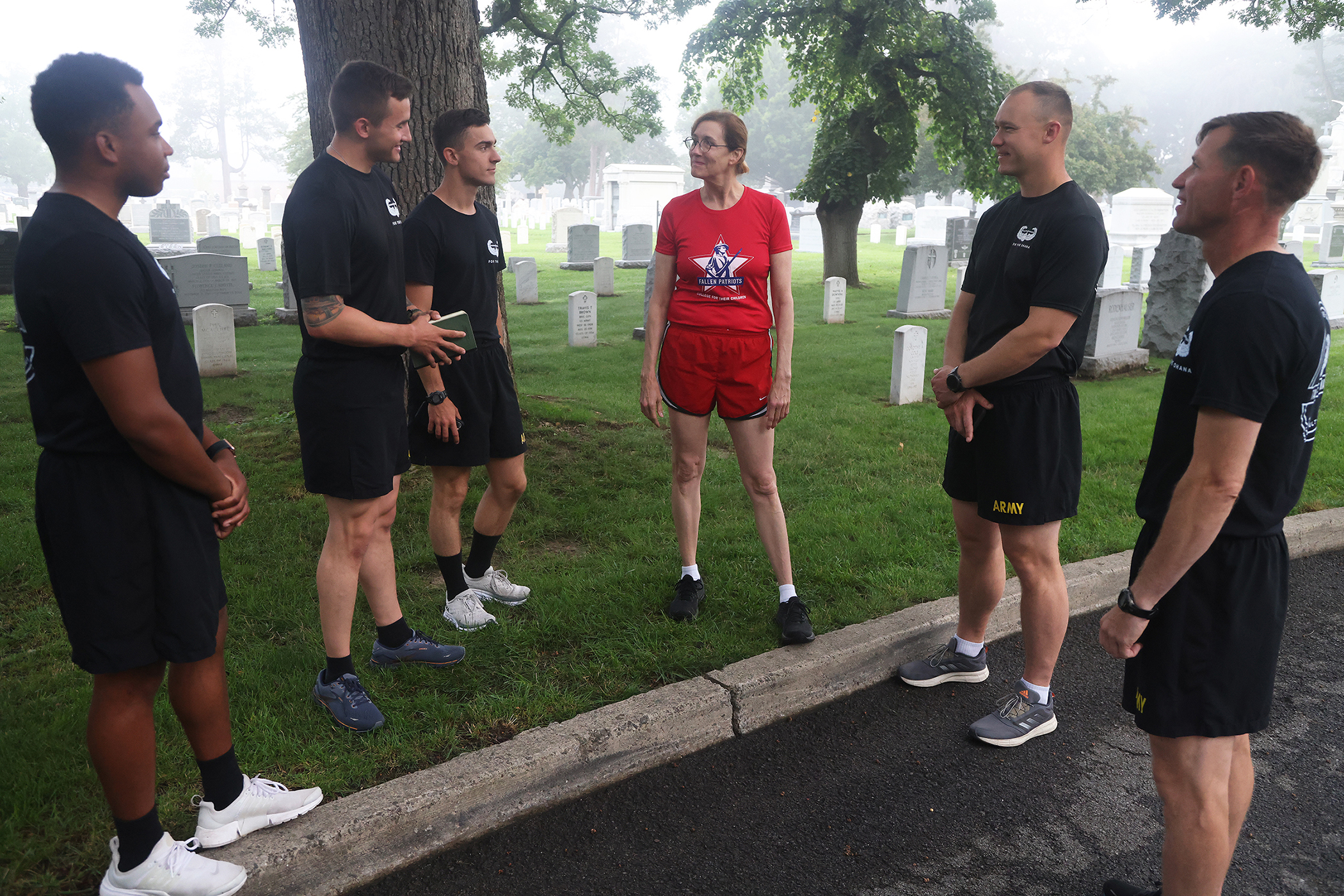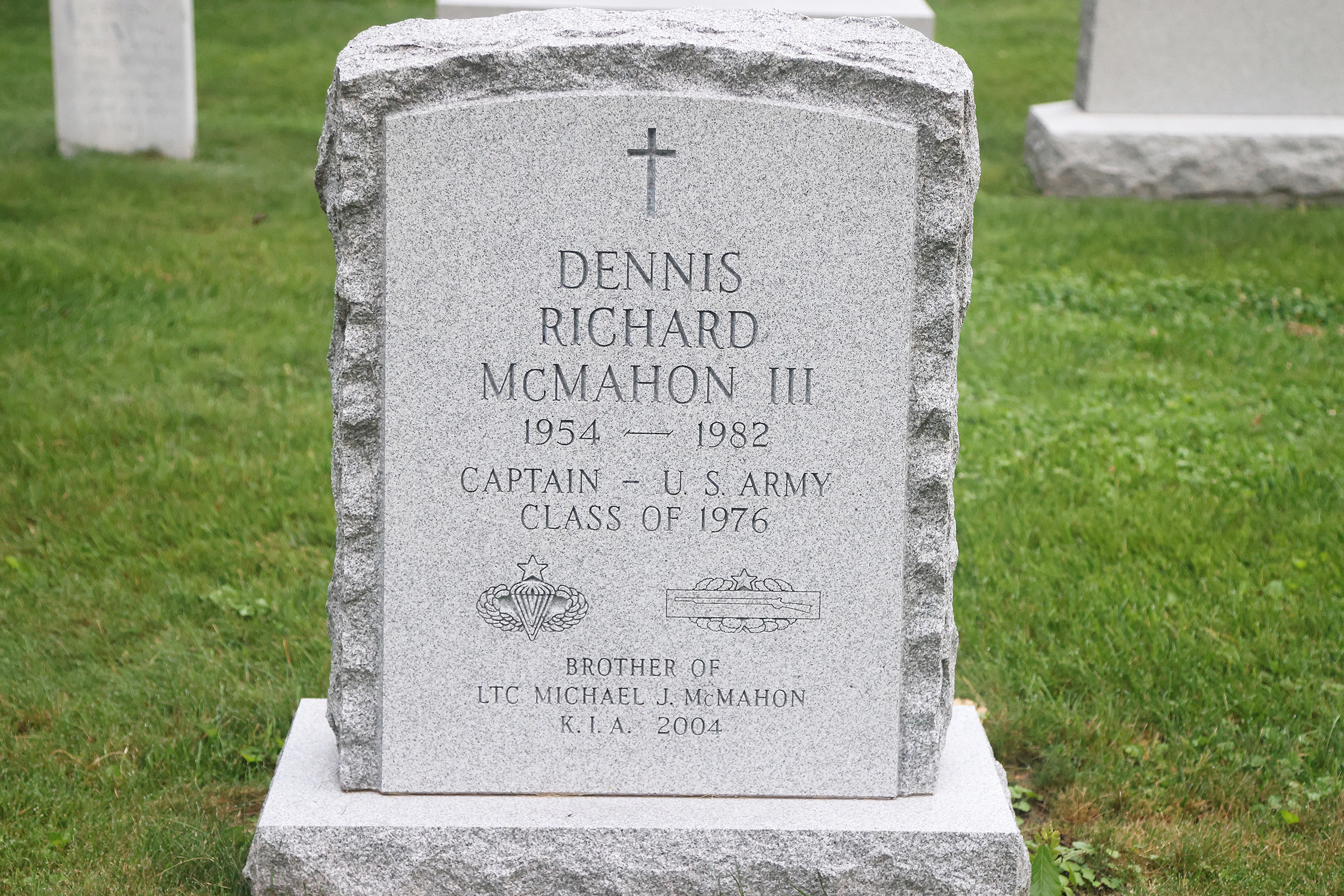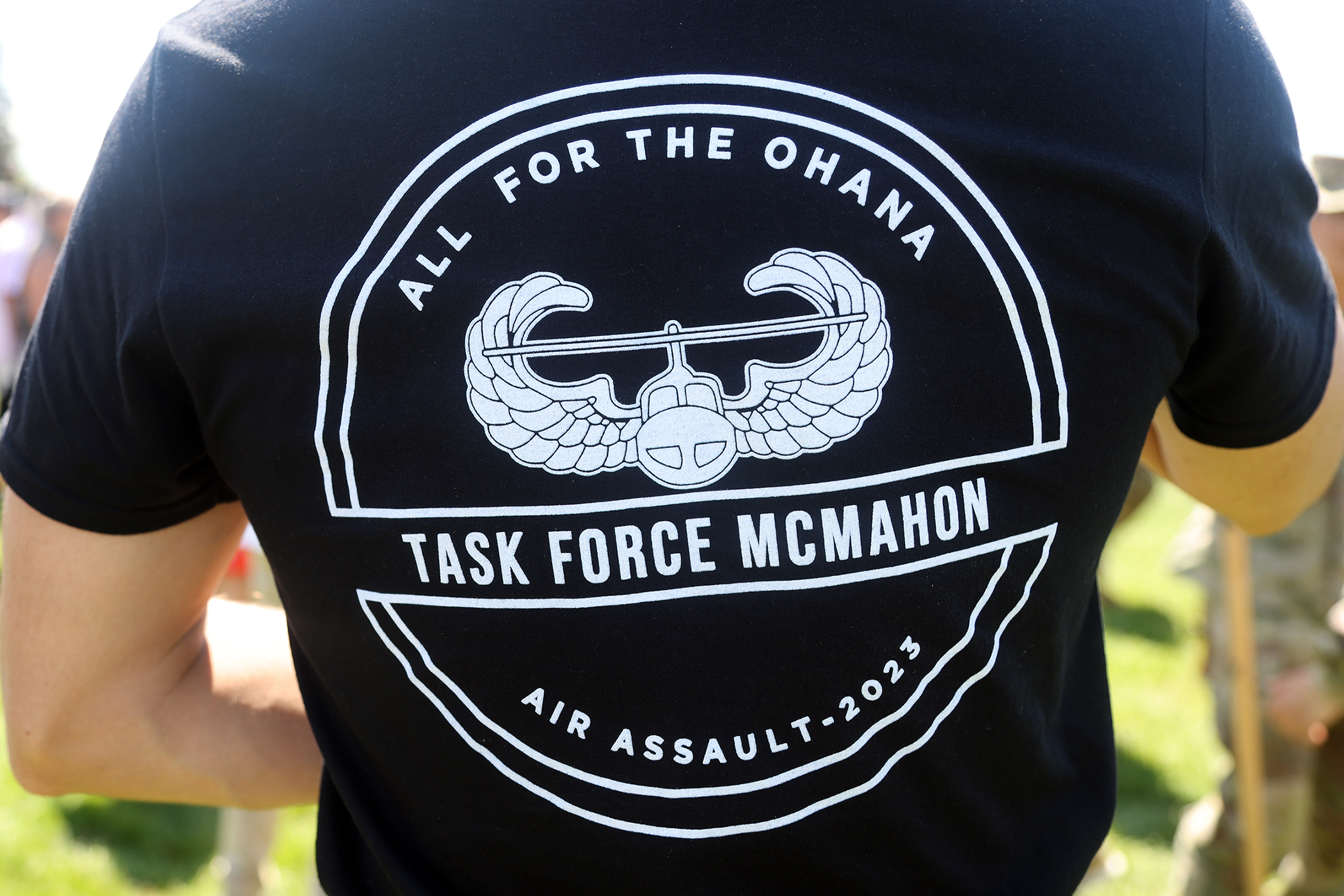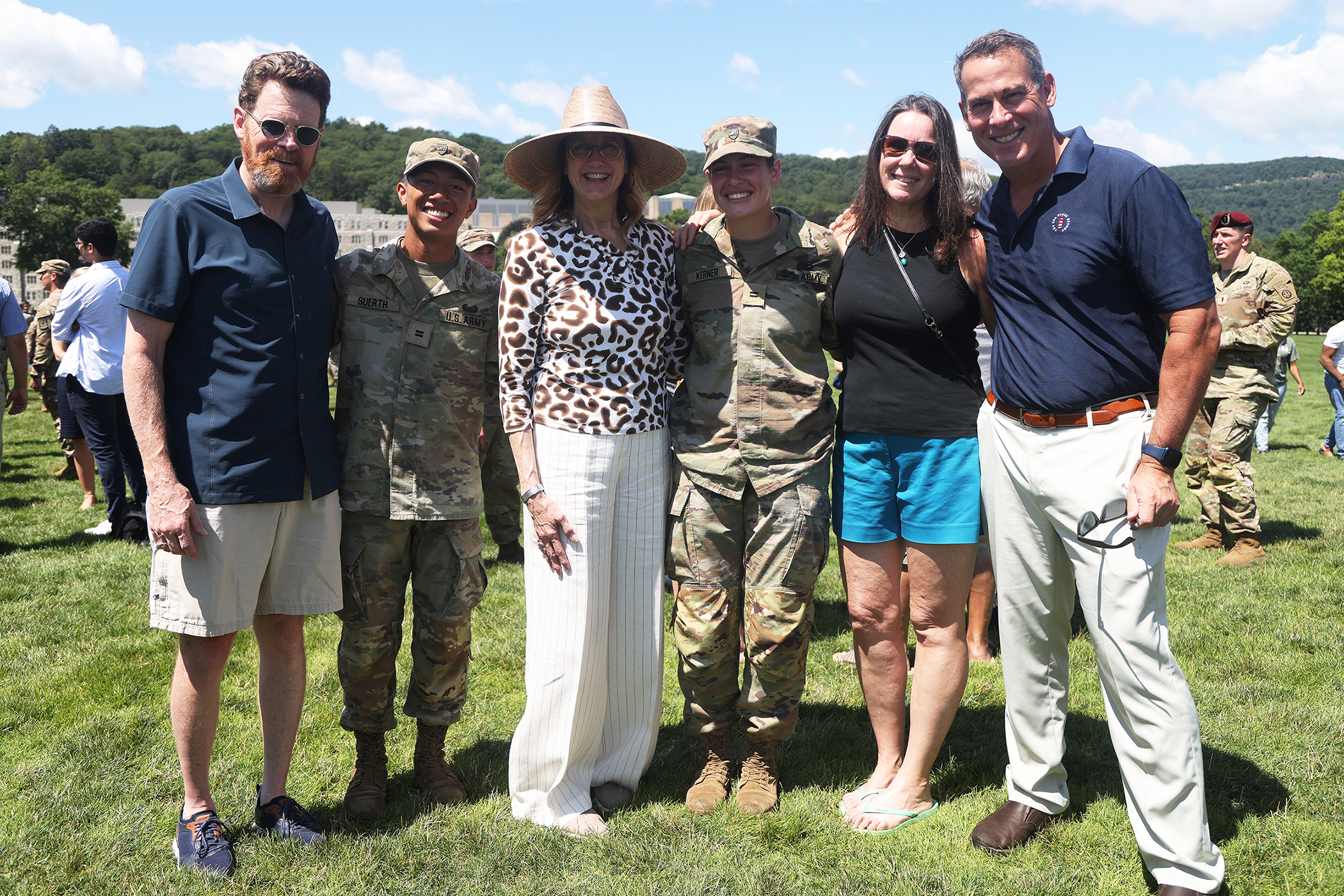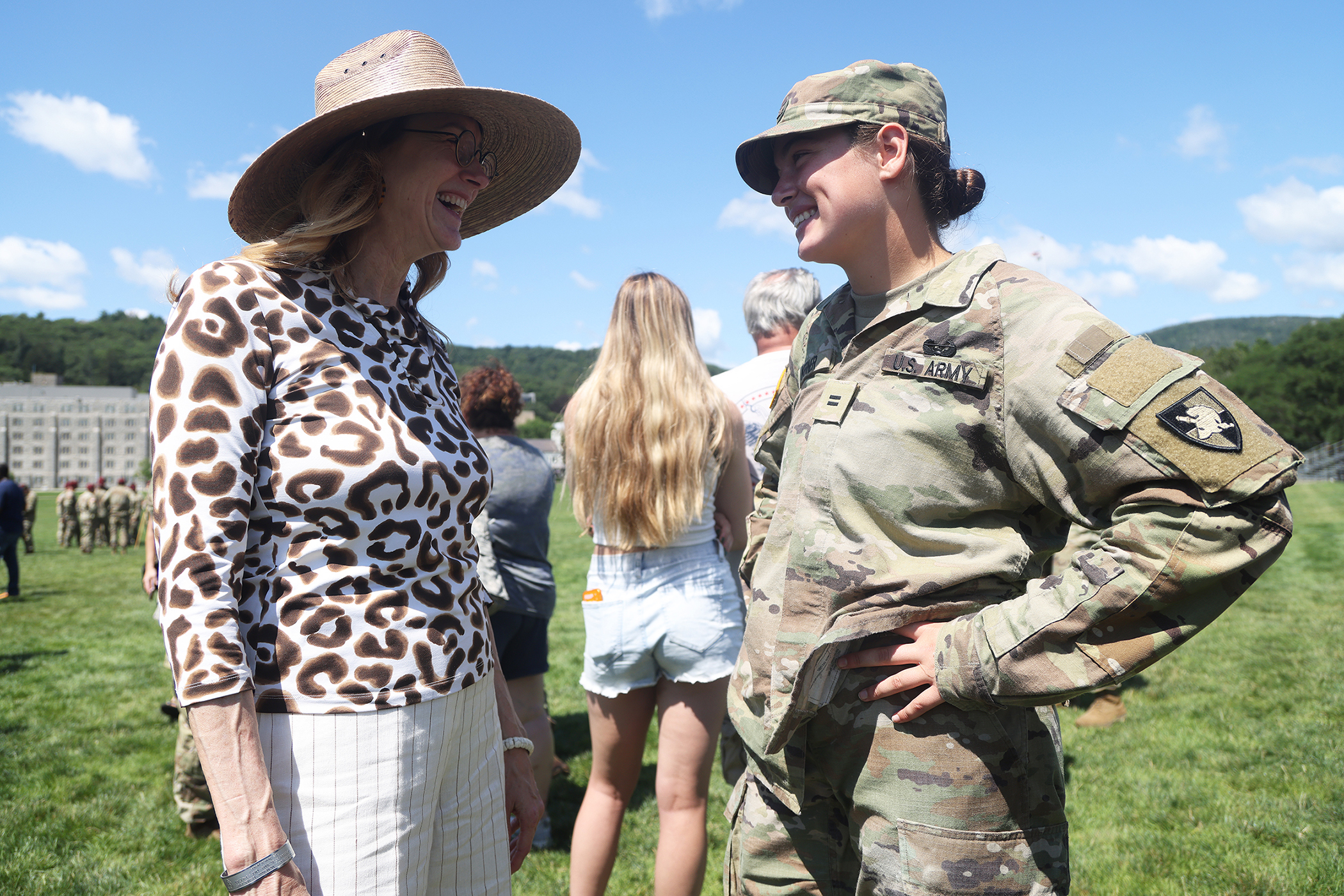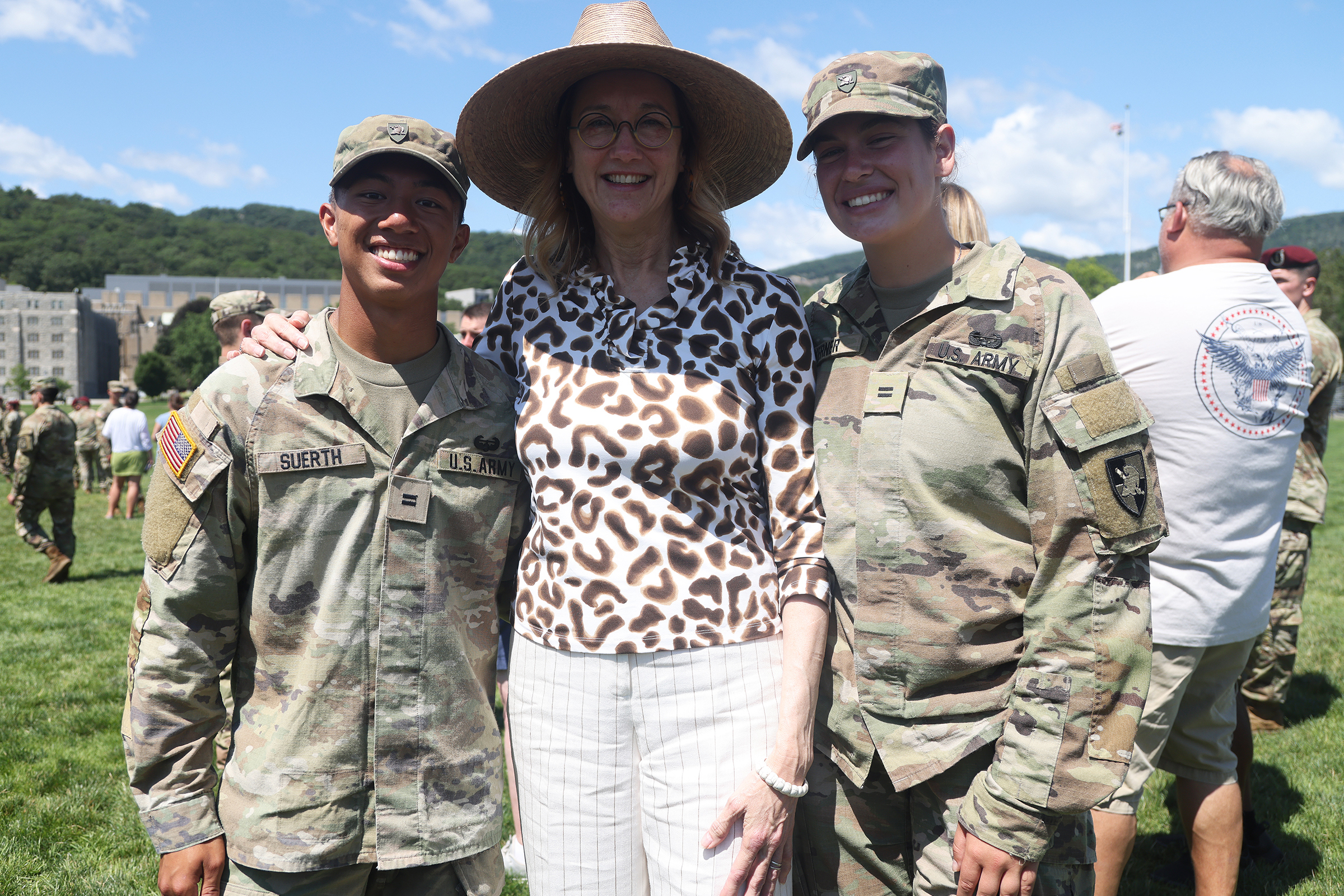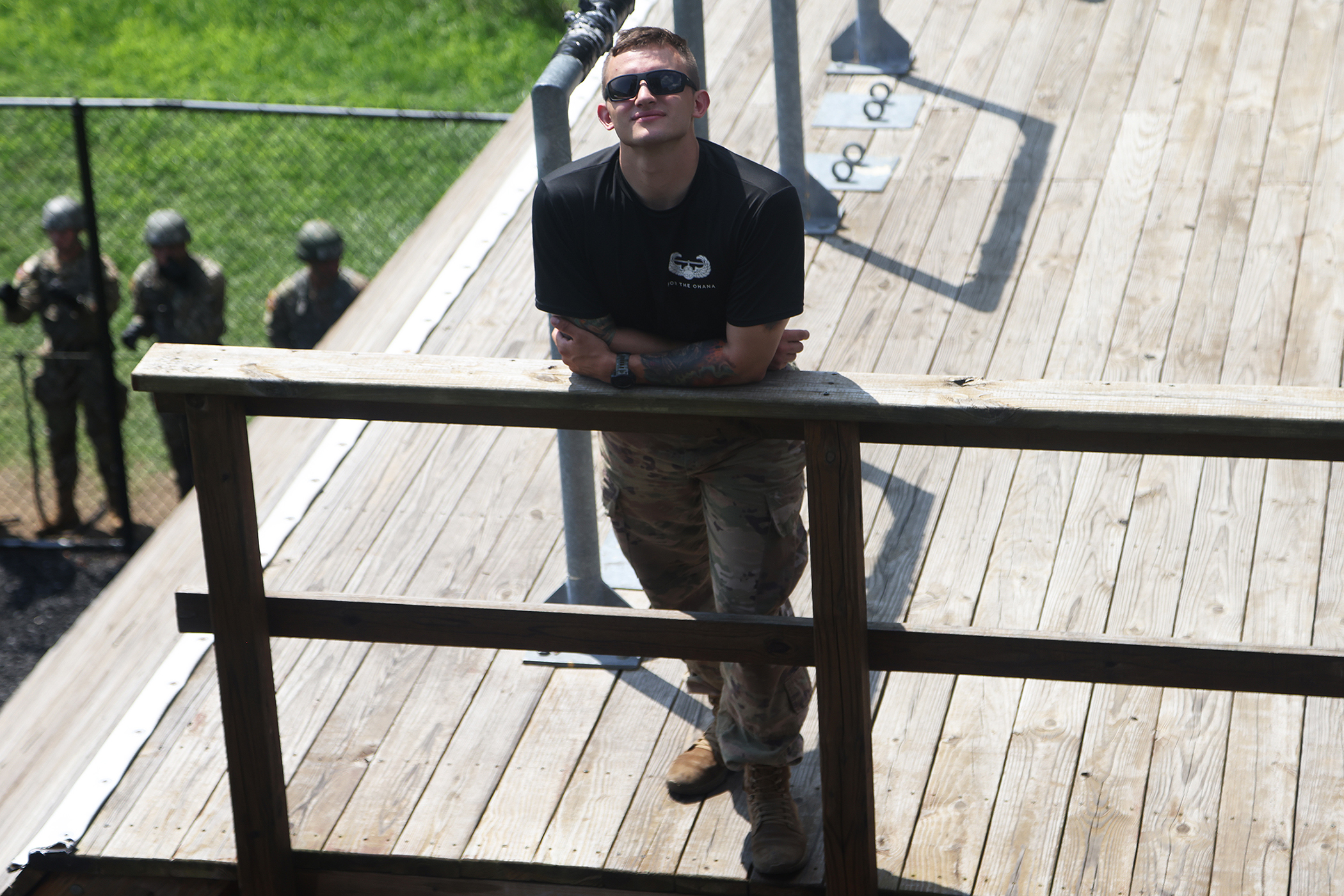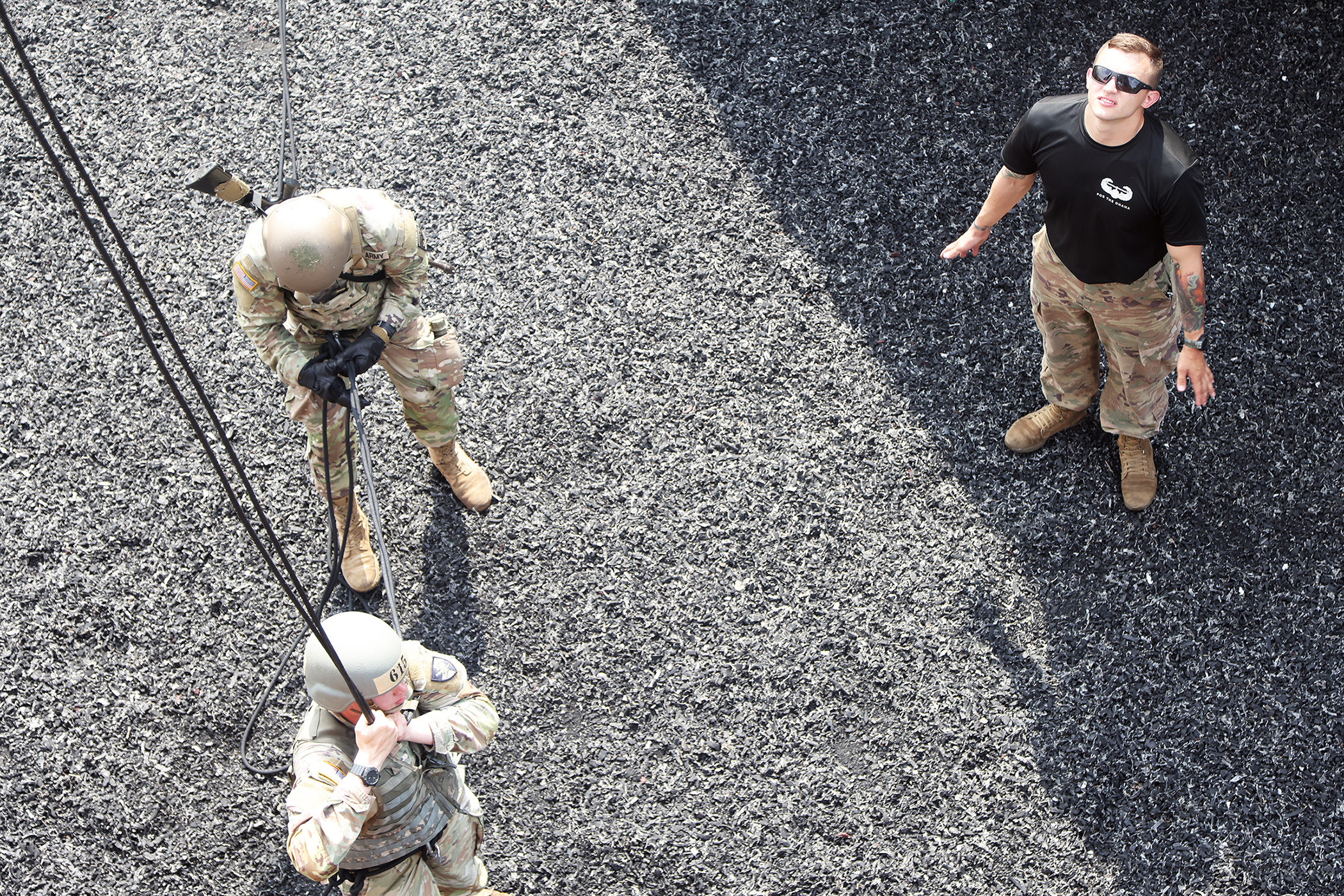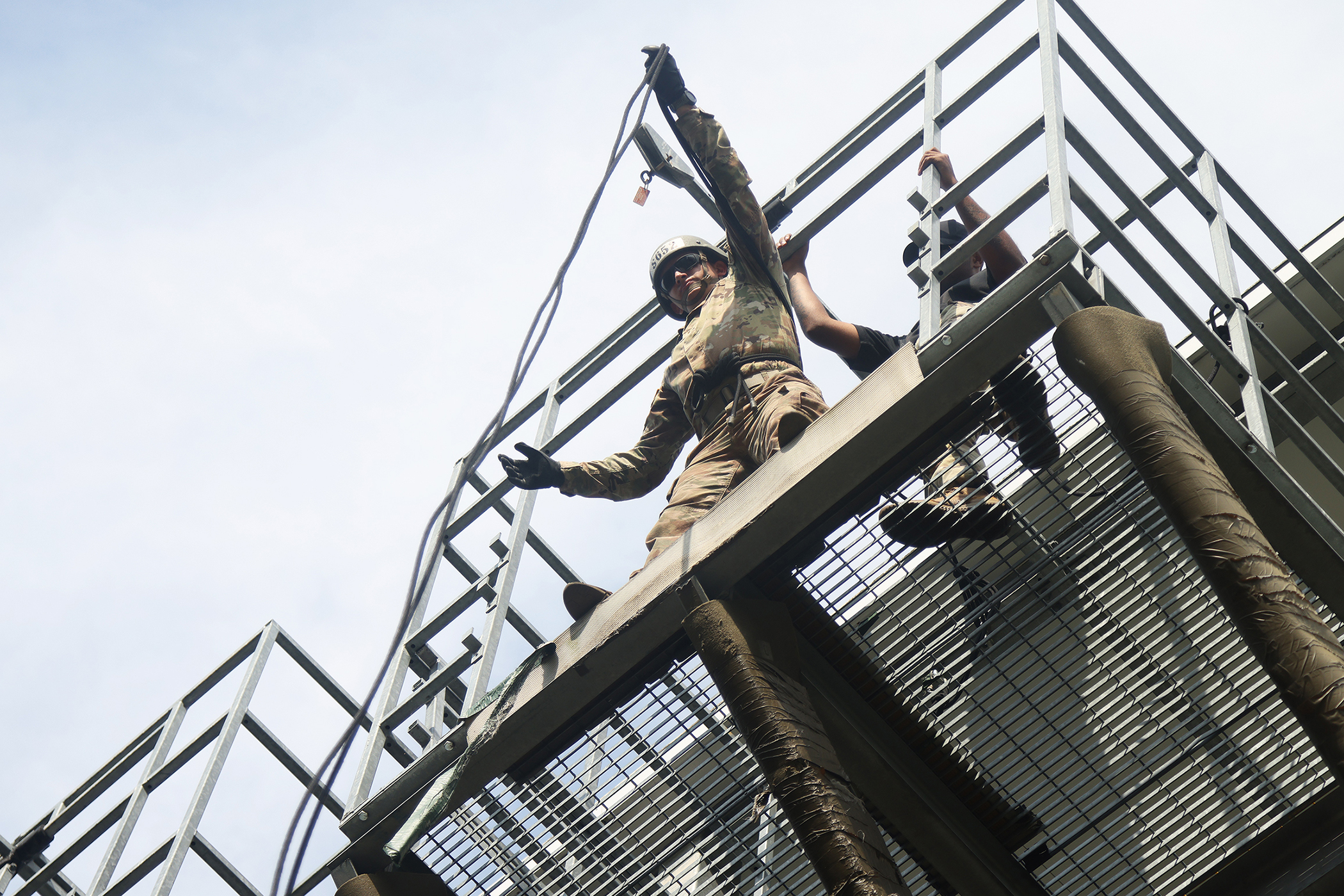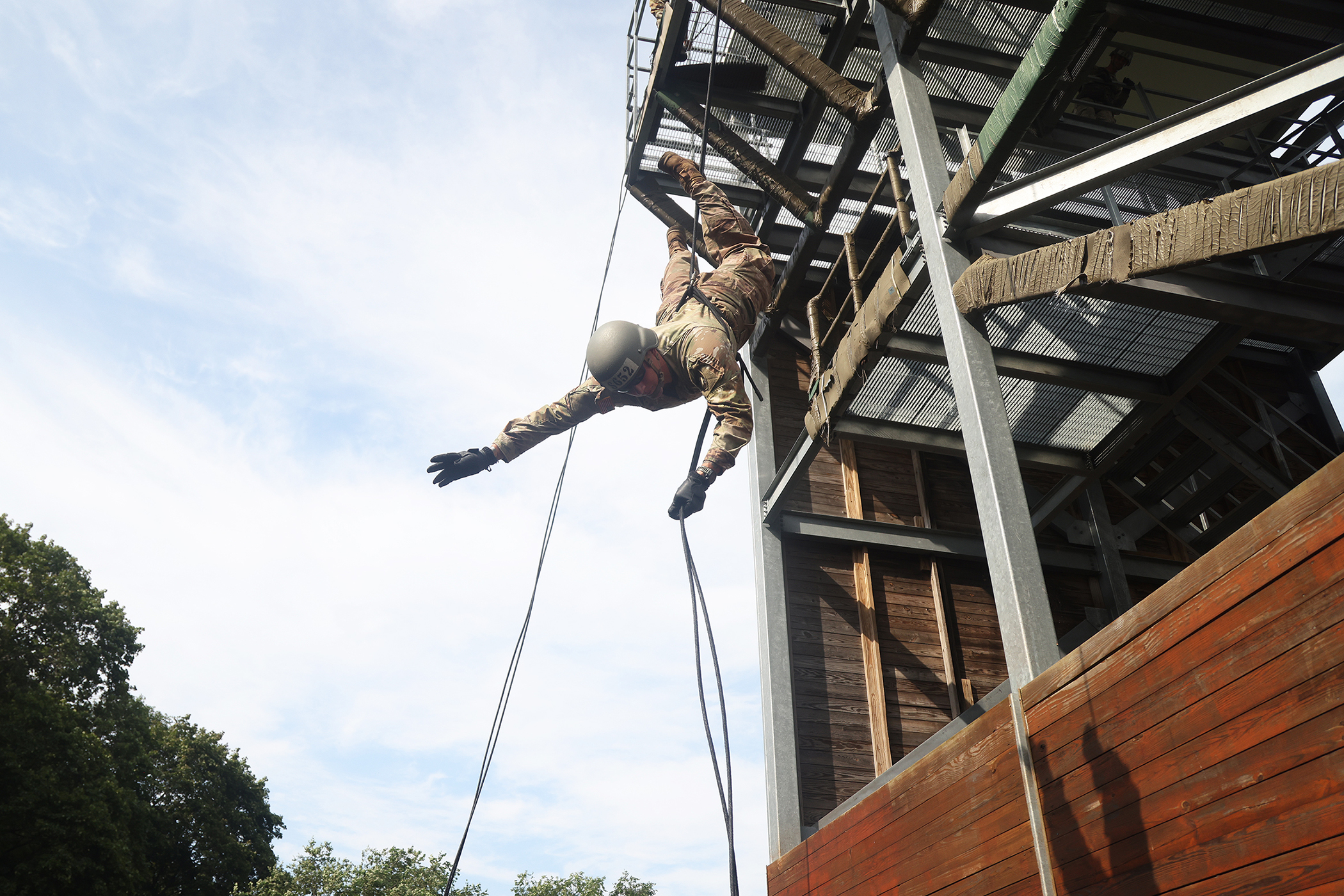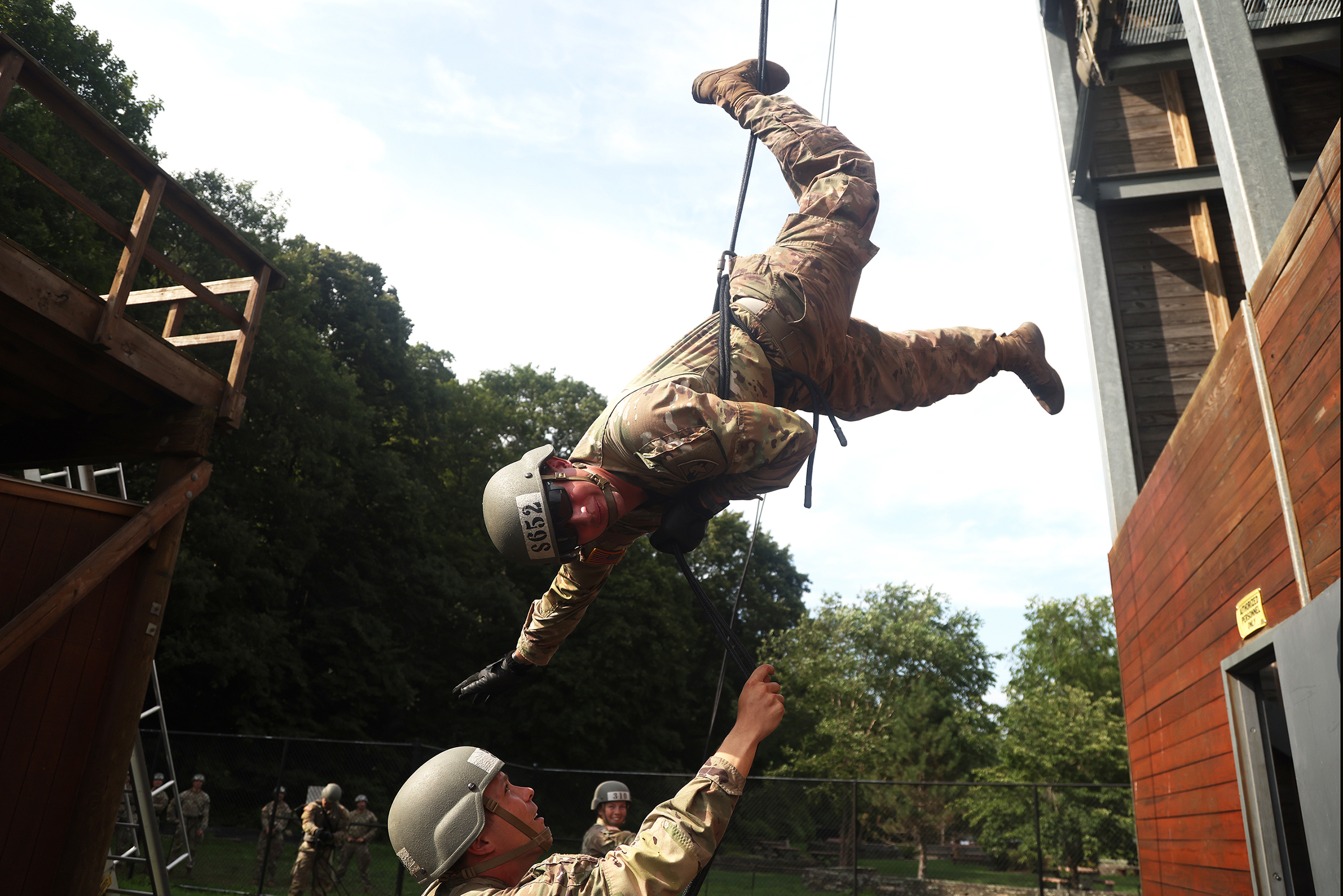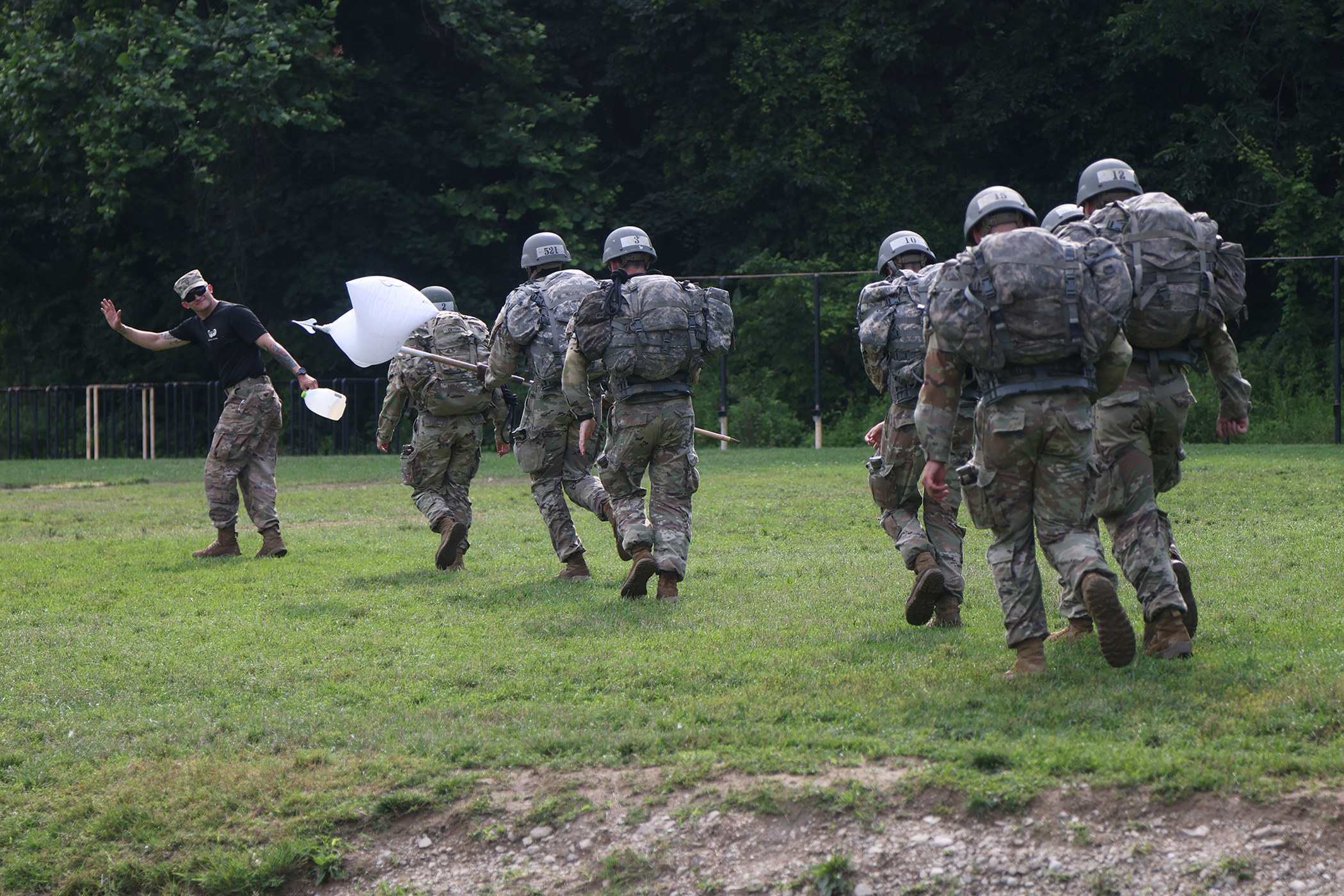(Editor’s note: This is part II of the air assault two-part series, click here if you’re interested in part I.
His voice cracked as his remarks were deliberately delivered to the attentive group of air assault trainees who were taking in every word intently about his father. The purpose of the speech was to remind the group of nearly 190 participants that attention to detail and meticulousness in their work to do it 100% accurately without room for error has life or death consequences for those who put their trust in them.
It was an eerily foggy morning on July 26 in the peacefully silent West Point Cemetery, minus a few random chirps from birds, where Class of 2025 Cadet Dennis Richard “Ricky” McMahon IV spoke about his father, Lt. Col. Michael Jerome McMahon, a 1985 U.S. Military Academy graduate, to the trainees of the fourth iteration of The Sabalauski Air Assault School (TSAAS) at the academy this summer.
From June 22 through Aug. 6, TSAAS holds five 10-day sessions of its air assault school at West Point for about 250 participants, mainly cadets, per session. During this summer’s air assault detail, much like the other West Point summer details such as Cadet Field Training, it is named after a graduate who died in the recent era of the Global War on Terrorism.
This year’s air assault detail is named Task Force McMahon after Ricky’s dad who died in a plane crash in Bamiyan, Afghanistan, in 2004. The black T-shirts that the air assault instructors and cadet cadre wear during the detail reads, “All For the ‘Ohana – Task Force McMahon,” as ‘Ohana is a Hawaiian term meaning “Family.”
McMahon, a Systems and Decision Sciences major, is the S-4 (Supply, Transportation, Logistics) of the air assault detail, which he said his job revolves around “Beans, Bandages and Bullets.”
“When not fulfilling the various requests for supplies from incoming air assault trainees, I coordinate the preparation and movement of many bags of ice we use to facilitate training and treat heat casualties,” said McMahon, the self-proclaimed Army Brat who grew up in places like Hawaii, Fort Hood, Texas (now Fort Cavazos), and West Point. “However, with such a small staff for this detail, I often find myself helping my other S-shops in their duties and they helped with mine. We created not just a ‘team’ but a ‘family’ to overcome the many challenges of supporting the rigorous air assault training.”
McMahon had to step up into the position of the S-4 since he was pegged to be the assistant S-4, due to his class year as a rising junior, but was “surprisingly” promoted into the position.
“I was quite hesitant having already been told by many of the long hours and difficult tasks I would be faced with as the assistant S-4, and now I had to help steer the ship,” McMahon said. “I was nervous. However, this detail has further cemented my belief that teamwork makes the dream work, and without the other amazing cadets, noncommissioned officers (NCOs), tactical officers (TACs), medics and task force and other cadets in other details who have helped us facilitate our training – I would have struggled exponentially more with my position.”
The detail has helped build his confidence and foundation as a leader, but he does come with plenty of life experience as he is a prior-service Soldier, a combat engineer (12 Bravo), who served in the Vermont National Guard, while earning a bachelor’s degree in political science at Norwich University in Vermont.
“As my TAC NCO likes to say that I’m ‘Two Scoops of Hooah’ and while my parents were both aviators, as a combat engineer, I was able to see the level of support required to enable combat arms,” McMahon said. “Boy, it’s no joke. I fought for this position so I could gain experience in supplying a fluid and dynamic force. Furthermore, it has only cemented my leadership philosophy on the pertinence of healthy attitudes and teamwork through the development of a familial unit or an ‘Ohana.”
Following parents’ legacy to West Point, thoughts about detail named after his father
While his two older brothers took different paths as a civilian mechanic and a civilian engineer involved in solar energy, McMahon was always intent on serving in the military and especially going to West Point since he was young. However, that path for the 24-year-old was not a straight one directly into the academy.
McMahon was unable to gain admittance to the academy during his first try out of high school and decided to go to Norwich University, where he joined the men’s rugby team and participated in Army ROTC. He said he felt removed from the military, so he chose to enlist in the Vermont National Guard.
“During that time, I continued my studies, attended Mountain Warfare School and was soon to be deployed,” McMahon said. “After finishing my bachelor’s degree in political science early, my unit was set to depart for Djibouti, Africa.”
Prior to his senior year at Norwich, he decided to submit one more application to West Point. He received his notification of his acceptance while at the range qualifying for the M249 Bravo machine gun preparing for his deployment.
“I did not want to grow old and live to possibly regret never giving West Point the old college try,” McMahon said about submitting his final application.
However, there was a dilemma in his mind as the days crept closer before the deployment, so he had to make a final decision on what he wanted to do. West Point doesn’t offer deferments and the deployment went about a month after he would have to arrive to West Point for Reception Day. With the importance of family, he wanted to serve with his guys in Africa, which made the decision a hard one.
“I did not want to leave my squad and for them to go on the deployment without me – I was extremely conflicted and couldn’t make a choice,” McMahon said. “Part of me wanted to ensure I was with my team, the other was inspired to follow my parents’ footsteps and earn the right to join the Long Gray Line. I eventually decided on attending the U.S. Military Academy and taking on the challenge of living up to the legacy my mother and father left behind, to create my own ‘Ohana at my new rocky mountain home.”
He credits his first sergeant for helping him make the decision to come to West Point, however, he did mention that at one point he decided to do a coin flip. Using a quarter, with George Washington being the heads of the coin and Washington Statue on The Plain being a major academy landmark, it signified going to West Point, or if it landed tails he would lean toward going on the deployment with his unit. If you believe in coincidence on how the coin landed, and that is how his destiny was meant to be, he now is following his mother, Jeanette, a retired colonel who is a 1983 USMA graduate, and father’s footsteps at the academy.
“My mother, despite being a rabble-rouser and full of ‘Go Army, Beat Navy’ spirit has never pushed me toward the military or West Point,” McMahon said. “I think it is a legacy I have slowly undertaken to carry onward. My father was remembered as an inclusive, joyful and supportive officer whom I hope I can emulate one day.”
When you tie a small bow around everything within McMahon’s legacy, he now is experiencing the venture of being a part of a summer detail named after and honoring his father.
“I feel an intense burden on my shoulders to ensure the success of the detail and the actual growth of the trainees in the air assault course,” said McMahon who earned his own air assault wings last summer. “My name is quite literally on the shirt. However, my father being honored by this summer detail is immeasurable in its impact on myself and my family. For each class that I have been on within our detail, we have an intro brief and a silent cemetery run. During both, I give a speech to the incoming air assault trainees about the history of my father, the events surrounding his death, what it means to me and what it could mean to them.
“I emphasize that while our cadre staff want them to earn the badge and become qualified that we rather them become individuals who have instilled the habits necessary to get their troops – their ‘Ohana – home,” he added. “I will admit, that in each brief I have given I have cried. However, my hope is that for at least one person, he or she will carry that conversation with them and just maybe they become the person to get that father, mother, brother, daughter home to their family. Because in the end, that means everything, it certainly did for me.”
A mother/wife’s thoughts, the cemetery experience and earning the badge
Jeannette McMahon, who is currently a development officer for Children of Fallen Patriots, is proud of her son for having the “foresight and energy to put together a proposal and submit it to the chain of command,” which led to the naming of Task Force McMahon.
“As a family, we feel honored to be able to have the opportunity to remember Mike’s legacy,” Jeanette said. “Mike and I met at Fort Campbell, Kentucky, the home of The Sabalauski Air Assault School, where we met, fell in love and got married while stationed there.”
Jeanette, who is also air assault qualified, will be the guest speaker at the graduation of the fifth and final iteration of air assault school on Aug. 6. She said she will speak about some of the same things that Ricky talks about during the cemetery speech.
“I want to convey the emphasis that Ricky points out when he addressed the trainees at the cemetery at his dad’s grave with attention to detail and measuring risk, and that making appropriate decisions as leaders saves lives and brings Soldiers home to their families each night,” Jeanette said. “In the end, I am confident their training puts them in a position to help keep us safe and to protect the freedoms of our country.”
As for her son’s involvement in the detail, she is proud of his continuing development as a leader.
“I am glad he has been able to step up to this challenge and use it as a learning experience, and add it as part of his lieutenant toolkit,” she said.
Then came the morning of the cemetery run by the fourth iteration air assault class, where McMahon got a chance to speak about his father to the remaining members of the class, which was down to about 190 from the day zero group.
McMahon started out by thanking the class for coming out and then proceeded to mention his dad and his uncle, who he is named after Capt. Dennis Richard McMahon III, a 1976 USMA graduate who was killed in a car accident in 1982 and is laid to rest a few headstones apart from Ricky’s dad.
He prefaced to the group about getting choked up while speaking, so he needed his notebook to keep himself on point while telling the story of his dad.
“With respect to the life of an aviator, those who choose aviation often have an expectation of a life of adrenaline through air assault missions, gun runs and medevacs of a hot LZ (Landing Zone),” McMahon said. “The reality can often be disappointing and even a little boring. Aviators like my father have to perform multiple inspections, long flight plans and mountains of paperwork for just a short flight. They often find themselves becoming a simple means of transportation – moving cargo – or flying long hours in a straight line.”
Although life as an aviator can be boring at times, Jeanette did tell a remarkable story of Michael while in Herat, Afghanistan, in September 2004 where his whole cavalry squadron was on a scouting mission, and they came upon a huge compound fire on the ground.
Jeanette recalled that Michael realized there was an NGO, a non-governmental operation such as Doctors Without Borders, or something similar, in the compound, with about 85 civilians who were being attacked by green-on-green fighting, and Michael sensed “they needed to get these folks out of there and they were now in danger.”
Jeanette said that Michael understood that with the way things were playing out, he needed to be on the ground to supervise clearing the area so they could bring in Black Hawks to evacuate.
Michael basically landed and jumped out of his OH-58 dual pilot aircraft so he could manage the ground operations because he had the ground troop there with Afghan National Forces and Afghan Police.
“They needed to be brought together so they could manage the situation,” Jeanette said. “They tried to push back the crowd so they could get the helicopters in.”
Jeanette said his unit successfully managed to get all the civilians out safely with no one killed even though it was very tense at points as Michael got hit in the head by some big rocks thrown by the crowd.
“One of the Special Forces guys who was on the ground called me (sometime) after Mike died (in the plane crash a couple months later) and wanted to share some stories,” Jeanette said. “He said, ‘You know, Mike, he was always doing a hundred things at one time, and he was kneeling on the ground while bleeding all over his face. A Special Forces medic was trying to staple his head together so he could stop the bleeding while (Mike) was talking on two radios.’”
After the incident, about a week later, Michael put his men in for awards because they acted bravely and calm in a dire situation while completing the mission without casualties. The head of Combined Forces Command-Afghanistan at the time, Lt. Gen. David Barno, came to award the members of the cavalry unit. Michael earned a Bronze Star with a Valor Device and a Purple Heart from that mission.
In bringing the element of ‘family’ together and in a moment where the world was reduced to a small place, when Barno was pinning Michael with his medals, he asked him, “McMahon, do you have a brother?”
“(Michael) said ‘Yes, Sir, my brother Dennis,’ and (Barno) goes, ‘Yeah, he was my roommate at West Point,’” Jeannette said. “David Barno was USMA Class of 1976 and Mike sent me these notes that he was worried about the general’s visit and after he realized that he knew his brother, he wasn’t worried about the visit anymore.”
While life as an aviator isn’t always that dramatic, McMahon during his speech reminded people about the monotony of the job, which in turn can lead to “people letting standards slip, going through the motions and that becomes the new standard, and everything is fine until someone dies.”
“My father was an aviator, and that meant he didn’t always know who was in the back of his aircraft,” McMahon said. “But what separated him from the rest is he treated every passenger like they were his family – their safety was paramount. He sacrificed his time and his energy to perform those menial tasks that had become monotonous for others. Unfortunately, one person’s lack of responsibility can be a catalyst for tragedy.”
Two months after the compound incident in November, McMahon’s father left his headquarters to another base to meet with his boss. After the meeting concluded, with a desire to get back to his family – his squadron, his ‘Ohana – he boarded an earlier flight. As the flight was about to taxi, his father had to jump off to make a call to cancel a meeting with one of his other bosses, but the plane waited for him.
With a crackle in his voice as he tried to compose himself through his obvious emotions, McMahon began by saying, “I know some of you might not be religious, and I’ve certainly been lost for a while, but I would like to think that someone or something was trying to get him home to his family.”
“My father’s desire to get back to the men and women he cared for was so great, he somehow managed to get them to stop the plane before it took off,” McMahon said. “Having listened to the last words my father spoke on the black box of that aircraft; I can tell you the pilots made numerous erroneous errors. They were undisciplined and caring more about the radio station they were listening to then planning a detailed route through their terrain. They did not sacrifice the time or energy to ensure the safety of their passengers like they were family.”
Due to the civilian-contractor pilots’ errors, all six people on board died when the CASA-12 plane crashed into the snow-covered Hindu Kush mountains. This happened while McMahon’s father commanded Task Force Saber, which provided security and reconstruction efforts in the cities of Herat and Farah.
But the key in telling this story from McMahon’s perspective is to remind the air assault trainees that every little detail is important whether it is attaching a sling-load properly without deficiencies or making sure a battle-buddy is harnessed and attached correctly to a rope correctly before rappelling from a tower or a Black Hawk.
“I say this because it’s bigger than air assault, it’s bigger than you, it’s bigger than me,” McMahon said. “I hope as your cadre, and I like to think the hope of my father too, is not that you pass this course, but rather you build the habits that allows you to become the person who gets them home to their family.”
After his speech, he told everyone to take a breath and a moment of silence to reflect on what this meant to them because to McMahon, “It meant the world to me.”
As for the class he spoke to, 185 of them ended up graduating on July 29. To McMahon, just like the recent participants, it was “fulfilling” to have earned his badge a year ago.
“My mom’s ear-to-ear grin throughout the ceremony made it worth all the Y-squats and eight-count push-ups,” said McMahon, who ran the 12-mile foot march in 1 hour, 52 minutes while earning the right to bear the colors during his graduation.
But the upcoming air assault graduation with his mother speaking will be very special for him, more so than his own graduation.
“I think opportunities such as this are once-in-a-lifetime and serve as a reminder that those lost are never forgotten,” McMahon said. “Living on in the deeds and thoughts of those who follow them, I like to think my dad will be in attendance, too.”

